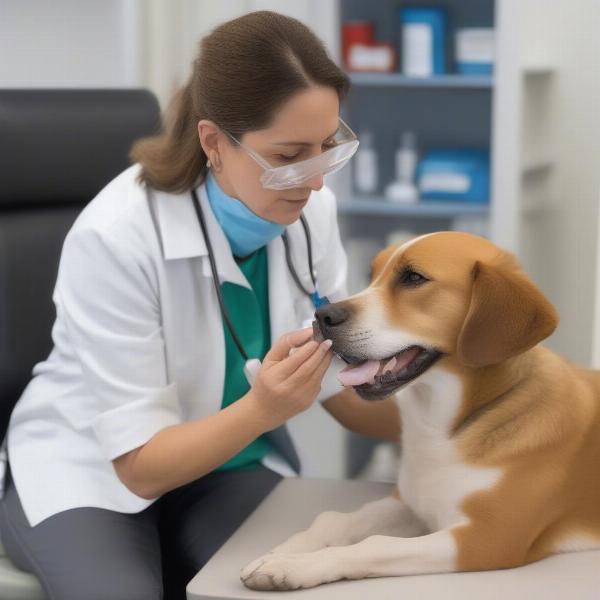The search for “dog antibiotics without vet prescription UK” suggests a pet owner facing a potential health issue with their dog and seeking a quick solution. While understandable, obtaining antibiotics without a veterinarian’s consultation carries significant risks. This article explores the dangers of using unregulated antibiotics for dogs in the UK, emphasizes the importance of professional veterinary care, and discusses responsible alternatives for managing your dog’s health.
Antibiotics are powerful medications that should only be administered under the guidance of a qualified veterinarian. Using antibiotics inappropriately can lead to antibiotic resistance, rendering them ineffective against future infections, not only for your dog but also potentially for humans. Furthermore, administering the wrong type or dosage of antibiotics can worsen your dog’s condition, potentially causing serious side effects or even death. In the UK, it is illegal to purchase prescription-only medications, including antibiotics, without a valid prescription from a registered veterinarian.
Why You Shouldn’t Give Your Dog Antibiotics Without a Vet Prescription
Several compelling reasons highlight the importance of seeking professional veterinary advice before administering any medication to your dog.
- Misdiagnosis: Without proper veterinary training, it’s easy to misinterpret your dog’s symptoms. What may appear to be a simple infection could be a symptom of a more serious underlying condition requiring different treatment.
- Incorrect Dosage: Administering the incorrect dosage of antibiotics can be just as harmful as using the wrong medication altogether. Too little may not effectively treat the infection, while too much can cause severe side effects.
- Antibiotic Resistance: Overuse and misuse of antibiotics contribute to the growing problem of antibiotic resistance. This means that the antibiotics become less effective against bacteria, making it harder to treat infections in both animals and humans.
- Masked Symptoms: Giving antibiotics without a proper diagnosis can mask underlying health problems, making it more difficult for your vet to accurately diagnose and treat the actual issue later on.
 Dog Taking Antibiotics Under Vet Supervision
Dog Taking Antibiotics Under Vet Supervision
Responsible Alternatives and When to See the Vet
If your dog is displaying signs of illness, the first step is always to consult with your veterinarian. They can perform a thorough examination, diagnose the problem, and prescribe the appropriate treatment if necessary.
- Observe and Monitor: If your dog seems slightly unwell but isn’t exhibiting severe symptoms, closely monitor their behavior, appetite, and bowel movements. Note any changes and contact your veterinarian for advice.
- Supportive Care: Depending on the symptoms, you can provide supportive care at home, such as ensuring your dog has access to fresh water, a comfortable resting place, and a bland diet if they have digestive upset.
- Natural Remedies: While not a replacement for veterinary care, some natural remedies, such as probiotics and certain herbal supplements, can support your dog’s immune system and overall well-being. However, it’s crucial to consult your vet before giving your dog any supplements, as some can interact with medications or worsen certain conditions.
What to Expect During a Vet Visit
A typical veterinary visit for a potential infection will involve a thorough physical examination, including checking your dog’s temperature, heart rate, and respiratory rate. The vet may also perform blood tests, urine analysis, or other diagnostic tests to identify the underlying cause of the illness. Based on the diagnosis, they will then prescribe the appropriate treatment, which may or may not include antibiotics.
“Never underestimate the value of a professional veterinary consultation,” says Dr. Emily Carter, DVM, MRCVS. “Accurate diagnosis and tailored treatment are essential for your dog’s well-being and can prevent potential complications from arising.”
Conclusion
Seeking veterinary advice is paramount for responsible dog ownership. While the desire to quickly alleviate your dog’s discomfort is understandable, obtaining dog antibiotics without a vet prescription in the UK is illegal and poses significant risks. Prioritize your pet’s health by consulting with a qualified veterinarian for accurate diagnosis and appropriate treatment.
FAQ
- What should I do if I suspect my dog needs antibiotics? Always consult with your veterinarian. They are the only ones qualified to diagnose and prescribe the appropriate medication.
- Are there any over-the-counter antibiotics for dogs in the UK? No, antibiotics for dogs are prescription-only medications in the UK.
- Can I use leftover antibiotics from a previous prescription? No, never give your dog leftover antibiotics or medication prescribed for another animal.
- What are the risks of giving my dog the wrong antibiotics? The wrong antibiotics can be ineffective, worsen the condition, cause side effects, and contribute to antibiotic resistance.
- What are some signs of antibiotic resistance in dogs? Signs may include recurring infections, infections that don’t respond to antibiotics, and prolonged illness.
- How can I prevent my dog from needing antibiotics? Maintain good hygiene, ensure your dog is up-to-date on vaccinations, and provide a healthy diet and lifestyle.
- What are some natural ways to boost my dog’s immune system? Consult your vet about incorporating probiotics, certain herbal supplements, and a balanced diet to support your dog’s immune health.
ILM Dog is a leading international online resource dedicated to providing expert advice on dog care and well-being. We offer comprehensive information on everything from breed selection and health care to training and nutrition. Our mission is to empower dog owners with the knowledge and resources they need to provide the best possible care for their canine companions. For professional guidance tailored to your dog’s unique needs, contact us at [email protected] or call us at +44 20-3965-8624. ILM Dog is here to help you navigate every step of your dog ownership journey.